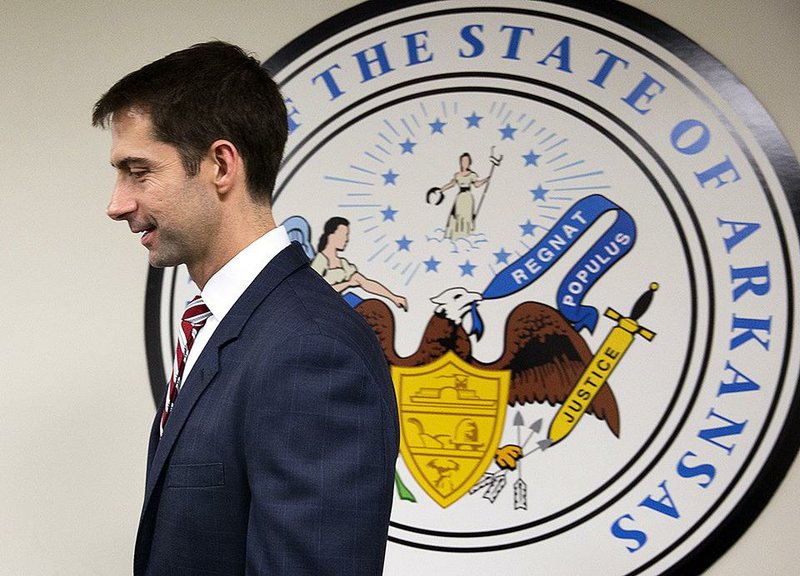WASHINGTON -- A letter to Iranian leaders written by U.S. Sen. Tom Cotton and signed by 46 other Republican senators not only drew swift, sharp criticism from President Barack Obama and Democrats last week, but it also cast a national spotlight on Arkansas' freshman senator.
Released Monday, the open letter to leaders of the Islamic Republic noted that without congressional approval, any nuclear-arms deal agreed to by Obama and Iran can be revoked when the president leaves office in 2017. The Obama administration has called the letter an unprecedented intrusion into the president's role as the "sole organ" to set foreign policy for the United States.
Thousands of news outlets have published articles and video in the past week examining the letter, Cotton and the other signers' possible motivations, and what role Cotton will play in future foreign policy discussions.
The New York Times wrote Wednesday that Cotton "personifies a wave of Republican newcomers to the Senate who back a hawkish, interventionist foreign policy." The Washington Post called him a "leading GOP national security hawk," Politico described him as "one of the chief antagonists of President Barack Obama's foreign policy," and the Wall Street Journal called the letter and the ensuing media coverage "a kind of Senate coming-out party" for Cotton.
On Friday, Cotton was touring the U.S. detention facility in Guantanamo Bay, Cuba, and was unavailable for comment, his staff said.
The Arkansan, a former Army captain who served tours in Afghanistan and Iraq, told the Washington Post on Tuesday that he wasn't surprised by the response to the letter from the Obama administration and Democrats.
"They know they can't defend the terms of the deals they are negotiating," he said.
In televised interviews, Cotton hasn't seemed worried about the criticism either. On Tuesday, Fox's Megyn Kelly asked about U.S. Rep. Jared Polis, D-Colo., referring to Cotton on Twitter as "Tehran Tom."
"A few rhetorical bullets fired in a political debate don't really trouble me too much," Cotton said. "What I'm focused on is Iran and stopping Iran from getting a weapon and that's what 46 other senators are focused on and that's what the Congress is trying to stop the president from doing, negotiating a bad deal that would let Iran get the nuclear bomb."
Cotton appeared on multiple news shows during the week to discuss the letter and respond to criticism of it.
Along with local and national network new shows, he was on Fox and Friends and CNN's The Lead with Jake Tapper on Monday; MSNBC's Morning Joe, CNN's New Day and Fox's The Kelly File on Tuesday. On Wednesday night he was on On the Record with Greta Van Sustren.
Today he is to appear on CBS' Face the Nation.
Cotton's spokesman Caroline Rabbitt said interview requests from national and international media outlets have poured into the office since Monday.
"I couldn't even begin to tell you a number," Rabbitt said. "It was very high volume."
References to Cotton's name spiked on social media the day the letter came out and stayed consistently high most of the week, according to Topsy analytics, a website that tracks responses on social media.
"Tom Cotton" appeared in more than 60,000 tweets between Monday and Thursday. His Twitter handle, @SenTomCotton saw a similar spike, appearing more than 61,318 times in the same time period.
Rabbitt said some of the volume may have been driven by the senator's name being mentioned by local media talking about the other 46 signers.
"Just by sheer number of people that signed onto the letter it kind of exponentially grew his number of mentions," she said.
Multiple hashtags, used to connect threads of an online topic, were used over and over as well. The tag #47Traitors, used by people critical of the letter, had appeared on 346,790 tweets as of Friday. The response tag #47Patriots, used by supporters, was used 24,500 time by Friday night. The generic tag #Iranletter appeared more than 47,000 times.
Rabbitt said a few thousand more people started following the senator on Facebook and Twitter after the letter came out, and the number of calls and letters to the office from around the country rose "significantly." Rabbitt said calls from Arkansans were predominately positive.
Cotton has captured national attention repeatedly over the past few years, especially in the closely watched U.S. Senate race in which he unseated incumbent Democrat Mark Pryor. It hasn't faded since he took office in January, prompting some to compare Cotton with other Republicans who quickly made names for themselves upon joining the Senate.
Salon wrote Thursday, "Right now, Cotton is playing the same role in foreign policy debates that Ted Cruz [R-Texas] played in the Obamacare funding fights of 2013." National Journal wrote Thursday that "now that Cotton is a senator himself, he appears to be following the outline of Cruz's freshman year playbook: Open big, ruffle feathers, and keep running."
The days when a new senator worked his way up from the back bench have disappeared in the past few decades as rules have changed and a greater emphasis has been placed on party ideology over seniority, University of Arkansas at Little Rock assistant professor Greg Shufeldt said.
"It creates a vacuum where someone like Tom Cotton can come in and be a quote-unquote 'leader' on an issue right away as opposed to being just the junior member of a committee and working his or her way up the ladder," Shufeldt said. "It says a lot, actually, about American politics. For better or for worse, freshmen senators really hit the ground running."
Shufeldt said that while the majority of Republican senators signed the letter, reaction among media outlets traditionally thought of as more conservative was split on it.
"You can see the National Review praises Tom Cotton while the Wall Street Journal says that it's a distraction," Shufeldt said. "Today's Republican Party is maybe not as homogeneous as we would have thought it was 10, 15, even 20 years ago."
SundayMonday on 03/15/2015

